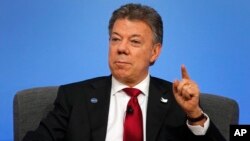Colombia will have completed negotiations with leftist FARC rebels by July 20, President Juan Manuel Santos said on Monday, in what would be a key step in efforts to end more than five decades of war in the Andean country.
The government has been in talks in Cuba with the Revolutionary Armed Forces of Colombia, or FARC, since late 2012. The two sides have reached accords on more than half a dozen topics but have yet to come to agreement on a bilateral ceasefire or implementation of a deal.
"I think that by July 20 we will have been able to close negotiations in Havana and from there a new era for the country will come," Santos said after a Cabinet meeting.
Negotiators missed a self-imposed deadline for signing a deal in March, and Santos has come under fire over the past week for comments about the referendum he has promised will take place to approve a deal.
The country's right-wing opposition, led by former President Alvaro Uribe, now a senator, has called for the public to vote against the peace deal, which he says will grant rebels impunity for human rights violations.
Santos was criticized by opposition figures earlier on Monday for suggesting Colombia will have to raise taxes to fund the war if a peace deal falls through.
"It's been said we'll raise taxes to pay for peace, but it's the opposite, if the war continues we'll have to raise taxes to finance it - war is more expensive," Santos said on public television.
Uribe told journalists the tax comments were "an act of intimidation" aimed at scaring Colombians into voting for a peace deal in the eventual referendum.
Santos said last week the FARC was prepared to return to the battlefield, especially in urban areas, if peace negotiations fall apart, which opposition figures criticized as fear-mongering.
Santos has said a tax reform bill, considered vital as plunging oil revenues have battered national income, will be approved by congress before the end of the year. The president also has said a peace deal could fuel economic growth of 2 percent.
He reiterated a call on Monday evening for the country's highest court to approve the public vote.
"Hopefully the Constitutional Court will approve the plebiscite soon and from there we will have another very important challenge," the president said.





